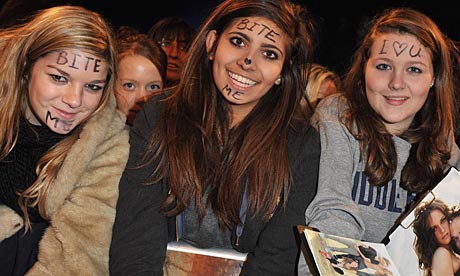Young readers have to be left to find their own way to books they like
Posted by Imogen Russell Williams Tuesday 7 June 2011, The Guardian

Twilight fans in London in 2009. Photograph: Jon Furniss/WireImage.com
Meghan Cox Gurdon's recent Wall Street Journal article about the prevalence of darkness, violence and general disagreeableness in Young Adult fiction has, predictably, caused a bit of a hoo-ha. Many devotees of YA novels, both lay enthusiasts and experts (of whom Gurdon herself is ostensibly one), have rolled up sleeves, girded loins and taken to the Twittersphere in wrathful droves to answer the WSJ under the hashtag #YAsaves.
Personally, I think Amy Freeman, the mother who retired defeated from the relevant section of Barnes and Noble, unable to light on anything she fancied for her 13-year-old, had a point – but only about the near-universal luridness of YA covers, not their content. Scanning the teen shelves at random might indeed create the impression that everything for the 13+ bracket involves vampires, Issues with a capital I, or a bit of both, but that's literally judging the books by the covers, against which even the proverbs warn. It's a shame no well-informed staff member popped up with a smile and a "Can I help you?" as Ms Freeman stood in vacillating distress, but that surely is the fault of the bookshop in question. To extrapolate a genre-wide condemnation from one shopping disappointment is quite a leap.
Some parts of the offending piece – which presents book-screening for adolescents as a duty the conscientious parent should undertake – are insidiously softly-spoken; shoulder-pattingly reasonable rather than straightforwardly, stridently seeking to save the children. "Now, whether you care if adolescents spend their time immersed in ugliness probably depends on your philosophical outlook," Gurdon says. "Reading about homicide doesn't turn a man into a murderer; reading about cheating on exams won't make a kid break the honour code. But the calculus that many parents make is less crude than that: It has to do with a child's happiness, moral development and tenderness of heart."
Who doesn't rate moral and emotional development; who doesn't want to give their children brightness, hope, and riverbank picnics, keeping them both from the Wild Wood and the Wide World? Nevertheless, I take issue quite vehemently with the question that she has framed – whether or not we want our feverishly reading adolescents deluged with blood, acclimatised to rape, encountering a spectrum of beastly "pathologies" in fictional form – as well as her negative answer.
Setting aside the fact that you can't read (for instance) Euripides without encountering child murder, rape, violence and abusive parents, and the fact that it's extremely uncommon to find an affecting and meaningful book devoid of uncomfortable content, the #YAsaves hashtaggers have overwhelmingly declared that exposure to upsetting, revolting, nightmarish fictional material is beneficial to people who've had similar experiences, and mind-broadening for those who haven't. I find Gurdon's idea that reading a distressing account of self-harm, for instance, would prompt troubled adolescents to follow suit entirely baffling. But I can easily envisage a self-harmer being comforted by the realisation that s/he is not alone, or a friend coming to understanding and sympathy as a result of their reading.
I have a daughter myself (albeit one not old enough to read), and I confess that I did have one ill-judged postpartum fantasy earlier this year about banning the Twilight oeuvre from the familial walls. I find Meyer's attitudes to gender, relationships and sex abhorrent, and potentially pernicious, and I reasoned that impressionable lasses do model their ideals, dreams and desires in part on what they read (if they're readers) as well as on what they see. Then clarity returned. The lure of the forbidden – the (hopefully) offputting ponderousness of the prose – the existence of libraries (if any are still around) and the joyful fact that by then Twilight will be, like, so 2005 all marched through my hormone-clouded brain, blaring their excellence as reasons not to ban anything book-shaped from Blyton to De Sade. Frankly, I think responsible parenting of a bibliophile child involves trusting them to read stuff you don't approve of, as well as offering, with desperate and winsome smiles, the stuff you do.
No comments:
Post a Comment